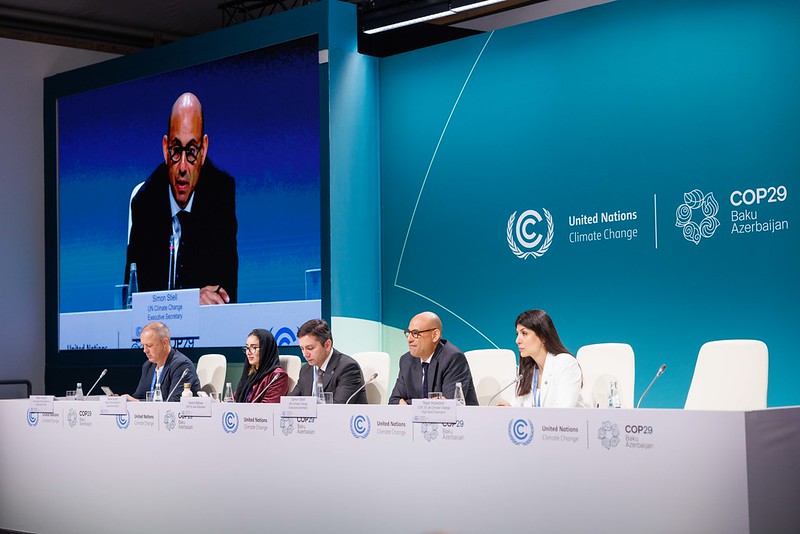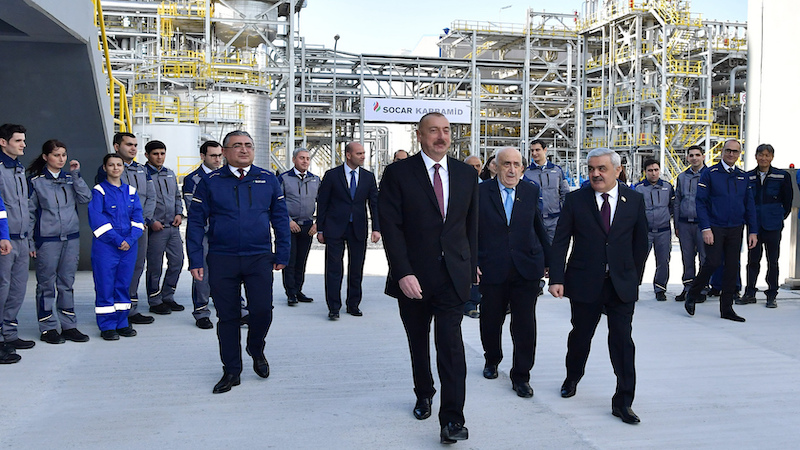Azerbaijan’s president repeats his claim that oil and gas are a “gift from the god” before the UN chief says “doubling down on fossil fuels is absurd”
This article will be updated throughout the day and an edited version will be sent out each evening as a newsletter, to which you can subscribe here.
Azerbaijan’s Aliyev doubles down on fossil fuels
Kicking off the leaders’ speeches segment of the COP29 climate summit in Baku on Tuesday, Azerbaijan’s president lashed out fiercely at his critics, doubled down on fossil fuels and failed to announce an expected new national climate plan (NDC).
Ilham Aliyev promoted his country’s solar projects and green energy zones, some of which Climate Home visited in May. They are concentrated in Nagorno-Karabakh, a disputed region from which Armenians were driven out by Azerbaijani forces during the most recent phase of the long conflict.
Aliyev then said he would “like to say a few words about another segment of our energy security, which is oil and gas – I understand that this topic is not very popular at a climate change conference but, without that, my comments would not be complete”.
He denied that Azerbaijan is a “petrostate” – as it has been labelled in press coverage – because it accounts for less than 1% of global oil and gas production. Aliyev said American “fake news media” should look at their own country, the world’s biggest oil and gas producer.
While the US does produce far more oil and gas than Azerbaijan, it is a much bigger economy so it is a lot less reliant on that oil and gas. Azerbaijan gets two-thirds of its revenue from oil and gas, the ninth highest figure in the world.
Aliyev said the foreign media had attacked him for saying fossil fuels were a “gift of the god”. He added: “I want to repeat it today here at this audience – it’s a gift of the god”.
He said countries cannot be blamed for bringing their natural resources to international markets, adding “we must be realistic”. He then talked about how the European Union had signed a deal to get more gas imports from his country after Russia invaded Ukraine, through to 2027.
He finished off with what he called a “message” to those who had called for a boycott of COP29, including NGOs. “I have bad news for them, we have 72,000 registered participants from 196 countries… so the world gathered in Baku and we say to the world ‘welcome’.”
He then shook hands with the head of the UN, Antonio Guterres, who got up to say in his speech to assembled leaders that “doubling down on fossil fuels is absurd”. The UN chief added that NDC climate plans compatible with limiting global warming to 1.5C mean countries have to “slash global fossil fuel production and consumption by 30%” by 2030.
In contrast to Aliyev’s criticism of “so-called independent NGOs”, Guterres said that “scientists, activists, and young people are demanding change – they must be heard, not silenced”.
UK’s new emissions target
British Prime Minister Keir Starmer has announced a new emissions reduction target of 81% by 2035 from 1990 levels – the figure recommended by official advisers in the UK’s Climate Change Committee (CCC).
Starmer told the press conference where he made the announcement in Baku that the UK is “building on our reputation as a climate leader”.
The UK’s current target is 68% by 2030 – which it is not on track to meet – on the way to net zero emissions by 2050.
Like Brazil on Friday, the UK has announced its 2035 target without releasing a full updated national climate plan (NDC) so the details of how it will be met are scarce.
The CCC’s chair Piers Forster welcomed the move as showing “climate leadership” but said the UK needs to do more to deliver its targets, like speeding up deployment of electric vehicles, heat pumps and tree planting
Campaigners’ reaction was broadly positive, with Oxfam GB’s Chiara Liguori and 350.org’s Kate Blagojevic both calling the new target “ambitious”.
But Rosemary Harris, Oil Change International’s North Sea senior campaigner, said Starmer had “failed to match strong words with a strong plan of action”, calling for his party’s promises to end oil and gas licensing in the UK to be reflected in the forthcoming NDC.
Developing countries unite on finance goal
After months of preliminary negotiations, in mid-October the co-chairs of talks on a new post-2025 climate finance goal (known as the NCQG) produced a nine-page document which they thought would serve as a good starting point for COP29.
But, according to three sources in closed-door discussions in Baku this morning, the umbrella group for developing countries (the G77 and China) told them to rip this up and start again, saying they could not accept the text as a basis for negotiations.
Some developing nations and different country groupings had submitted similar but varying asks before COP started, but they are now speaking with one voice and want their joint demands to be more prominent.
On the quantum – or size – of the NCQG, the G77 is proposing $1.3 trillion a year with sub-goals for mitigation (emissions-cutting measures), adaptation and loss and damage.
They want one goal for the money developed countries can provide and the private capital they can mobilise. They reject the idea of another goal for broader climate investments – something favoured by wealthy donor governments as a way of taking pressure off them.
And the G77 is standing firm on not widening the contributor base to richer emerging economies like Saudi Arabia and China. Developing countries say they will not even negotiate on any text that has expanding this base as an option.
Developed countries, for their part, are indicating that they don’t want to commit to providing more than $100 billion a year unless the contributor base is expanded, and they want to include a wider investment goal.
Developed countries are also pushing for a list of activities to be excluded from receiving climate finance to include fossil fuels projects and projects which harm human rights – both issues that developing countries are divided on.
The President of the Marshall Islands Hilda Heine said in her leaders speech that climate finance is “not market rate loans” and “it is definitely not finance that funds fossil fuel production”.
Negotiators will continue talking informally throughout the day and are due to provide new submissions by late afternoon. The co-chairs are then likely to go away and draft a new text, which will be out sometime on Wednesday.

UN climate chief Simon Stiell speaks at a COP 29 Presidency and UN Climate Change press conference at the COP29 climate conference in Baku, Azerbaijan on Nov 12, 2024. (Photo: UN Climate Change – Kamran Guliyev)
Simon Stiell: Climate finance is “global inflation insurance”
The UN climate chief has called on world leaders to skip any posturing at COP29 and demand strong outcomes, especially on finance.
Speaking at the opening of the World Leaders Climate Action Summit on Tuesday, Stiell warned that unless countries step up climate action, worsening climate impacts will put “inflation on steroids”.
Stiell – who urged the world to avoid a repeat of the COVID19 pandemic “when supply chains were smashed” – emphasised the need for climate finance “as global inflation insurance”.
Climate action has moved beyond saving lives, Stiell said, adding that the climate crisis “is fast becoming an economy-killer” with its impacts “carving up to 5% off GDP in many countries”.
He pointed out that climate disasters are driving up costs for households and businesses, fuelling “a cost-of-living crisis”.
This sentiment is not far-fetched. In last week’s US election, many voters pointed to how inflation has made household essentials expensive in recent years as a reason for wanting a change of government.
The Inflation Reduction Act (IRA) introduced in 2022 by the Biden administration aimed to curb price rises, create more jobs, boost spending on domestic energy production and promote clean energy, among other things.
Consumer prices spiked that year due to a range of factors, including Russia’s invasion of Ukraine and extreme weather that hit the US – from hurricanes to wildfires – damaging infrastructure and disrupting businesses. US inflation has since fallen back, but ordinary people are still feeling the pain.
Stiell said “rampant climate costs should be public enemy number one”, adding that bolder climate action “can drive economic opportunity and abundance everywhere”.
“Billions of people simply cannot afford for their governments to leave COP29 without a global climate finance goal,” he added.
Caught between conflict and climate change
The UN refugee agency (UNHCR) and 13 partner organisations have published a report mapping the links
Read More

